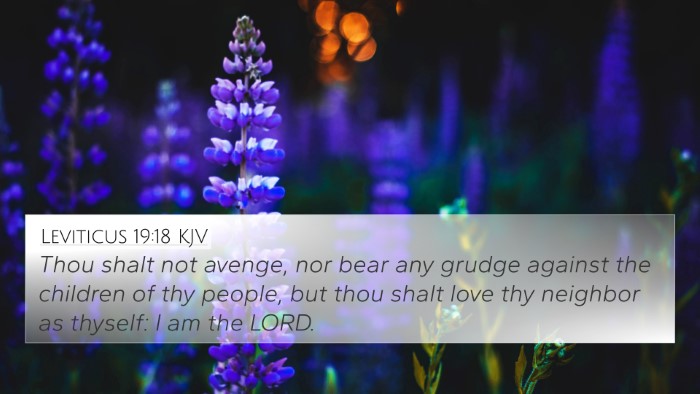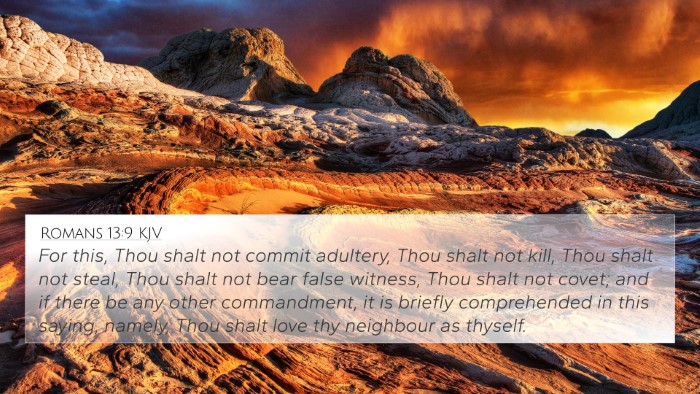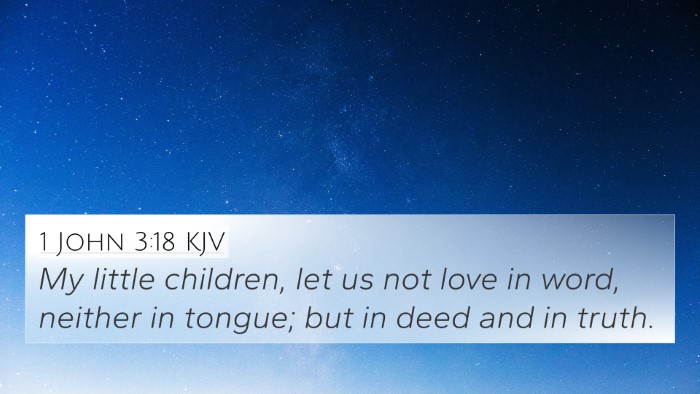Old Testament
Genesis Exodus Leviticus Numbers Deuteronomy Joshua Judges Ruth 1 Samuel 2 Samuel 1 Kings 2 Kings 1 Chronicles 2 Chronicles Ezra Nehemiah Esther Job Psalms Proverbs Ecclesiastes Song of Solomon Isaiah Jeremiah Lamentations Ezekiel Daniel Hosea Joel Amos Obadiah Jonah Micah Nahum Habakkuk Zephaniah Haggai Zechariah Malachi1 John 4:21 Similar Verses
1 John 4:21 Cross References
And this commandment have we from him, That he who loveth God love his brother also.
Uncover the Rich Themes and Topics of This Bible Verse
Listed below are the Bible themes associated with 1 John 4:21. We invite you to explore each theme to gain deeper insights into the Scriptures.
1 John 4:21 Cross Reference Verses
This section features a detailed cross-reference designed to enrich your understanding of the Scriptures. Below, you will find carefully selected verses that echo the themes and teachings related to 1 John 4:21 KJV. Click on any image to explore detailed analyses of related Bible verses and uncover deeper theological insights.

Leviticus 19:18 (KJV) »
Thou shalt not avenge, nor bear any grudge against the children of thy people, but thou shalt love thy neighbor as thyself: I am the LORD.

Matthew 22:37 (KJV) »
Jesus said unto him, Thou shalt love the Lord thy God with all thy heart, and with all thy soul, and with all thy mind.

1 John 3:11 (KJV) »
For this is the message that ye heard from the beginning, that we should love one another.

1 Thessalonians 4:9 (KJV) »
But as touching brotherly love ye need not that I write unto you: for ye yourselves are taught of God to love one another.

1 Peter 3:8 (KJV) »
Finally, be ye all of one mind, having compassion one of another, love as brethren, be pitiful, be courteous:

Galatians 5:14 (KJV) »
For all the law is fulfilled in one word, even in this; Thou shalt love thy neighbour as thyself.

Romans 13:9 (KJV) »
For this, Thou shalt not commit adultery, Thou shalt not kill, Thou shalt not steal, Thou shalt not bear false witness, Thou shalt not covet; and if there be any other commandment, it is briefly comprehended in this saying, namely, Thou shalt love thy neighbour as thyself.

John 13:34 (KJV) »
A new commandment I give unto you, That ye love one another; as I have loved you, that ye also love one another.

Romans 12:9 (KJV) »
Let love be without dissimulation. Abhor that which is evil; cleave to that which is good.

1 John 3:23 (KJV) »
And this is his commandment, That we should believe on the name of his Son Jesus Christ, and love one another, as he gave us commandment.

Luke 10:37 (KJV) »
And he said, He that shewed mercy on him. Then said Jesus unto him, Go, and do thou likewise.

1 Peter 4:8 (KJV) »
And above all things have fervent charity among yourselves: for charity shall cover the multitude of sins.

1 John 3:14 (KJV) »
We know that we have passed from death unto life, because we love the brethren. He that loveth not his brother abideth in death.

Mark 12:29 (KJV) »
And Jesus answered him, The first of all the commandments is, Hear, O Israel; The Lord our God is one Lord:

Galatians 5:6 (KJV) »
For in Jesus Christ neither circumcision availeth any thing, nor uncircumcision; but faith which worketh by love.

1 John 3:18 (KJV) »
My little children, let us not love in word, neither in tongue; but in deed and in truth.

Matthew 5:43 (KJV) »
Ye have heard that it hath been said, Thou shalt love thy neighbour, and hate thine enemy.
1 John 4:21 Verse Analysis and Similar Verses
Understanding 1 John 4:21
The verse states: "And this commandment have we from him, That he who loveth God love his brother also." This verse encapsulates a core Christian principle that highlights the interconnectedness of love for God and love for fellow humanity.
1. The Nature of God's Commandments
According to Matthew Henry, this commandment signifies the intrinsic link between our relationship with God and our relationships with others. It emphasizes that genuine love for God will naturally result in love for one another.
2. The Implication of Love
Albert Barnes explains that the object of this commandment is not just to love humans superficially but to demonstrate a sincere, active love that aligns with the nature of God. Love is a vital expression of faith and the fulfillment of God's law.
3. The Greatness of Love's Requirement
Adam Clarke notes that the command implies an obligation. Believers are urged to maintain an unconditional love for their brethren, reflecting God's love for them, and fulfilling this command is essential for authentic Christian living.
4. Love as Evidence of Faith
This verse serves as a litmus test for believers. If one claims to love God and harbors hatred or indifference towards others, there is a fundamental inconsistency in their spirituality, as expounded by Henry. Love is an evidence of faith.
5. Cross-Referencing Biblical Texts
To gain a deeper understanding of 1 John 4:21, we can explore several related scriptures that connect through the theme of love and the commandment:
- Matthew 22:37-39 - Jesus taught that we should love the Lord our God with all our heart and love our neighbor as ourselves.
- John 13:34-35 - Jesus gives a new commandment to love one another as He has loved us, indicating that this love is a defining mark of His disciples.
- 1 John 3:10 - This passage contrasts the children of God and the children of the devil, emphasizing love as a marker of true believers.
- 1 Peter 4:8 - Peter stresses the importance of fervent love among believers, indicating that love covers a multitude of sins.
- Romans 13:10 - Paul articulates that love is the fulfillment of the law, reinforcing the integral nature of love in Christian ethics.
- Galatians 5:14 - Paul reiterates that all the law is fulfilled in one word: love your neighbor as yourself.
- Luke 10:27 - This verse, similar to Matthew 22, emphasizes love for God and neighbor as the greatest commandments.
6. Thematic Connections in Scripture
These verses establish a thematic connection surrounding love—an essential aspect of the Christian doctrine that transcends individual texts and creates an inter-biblical dialogue that enriches comprehension of God's intentions for humanity.
7. Tools for Bible Cross-Referencing
Utilizing a bible concordance or a bible cross-reference system can enhance understanding of these connections. Such tools facilitate the identification of links between scriptures, unveiling the rich tapestry of Biblical teachings.
8. Conclusion
In summary, 1 John 4:21 is a profound reminder of the call to love within the Christian faith, emphasizing that true love for God necessitates love for others. Cross-referencing other verses solidifies this idea, enriching our comprehension and challenging us to embody the love of Christ in our daily lives.




